































Denise
Kate Stevenson EDITORIAL CONTRIBUTORS
Patricia-Ann Young
ith the exam diet just around the corner, it’s time to focus and start preparing for your assessments. It can be a stressful time, but the team at Source is here to guide you through the next few months, help you study like a pro, and help you find a work-life balance.
It’s all about your future in this issue, and we’re helping you to sort through your career choices on pages 8 and 15, before boosting your employability on page 25. All this and much more inside! PUBLISHER
Inside this issue, we encourage you to study smart on page 10, prioritise your mental health on page 13, and on page 30, we suggest some podcasts to listen to on your study breaks.
Once your exams are over, you’ll have to make some big decisions. On page 6, we talk you through your post-school options before getting you ready for university on page 23. If you fancy taking time out after all your hard work at school, we discuss the benefits of a gap year on page 28.
Rachael Fulton DESIGN AND PRODUCTION
Lucy Baillie lucy.baillie@dcpublishing.co.uk SALES
Marian Mathieson marian.mathieson@dcpublishing.co.uk
www.sourcemagazine.org.uk DC

4
6
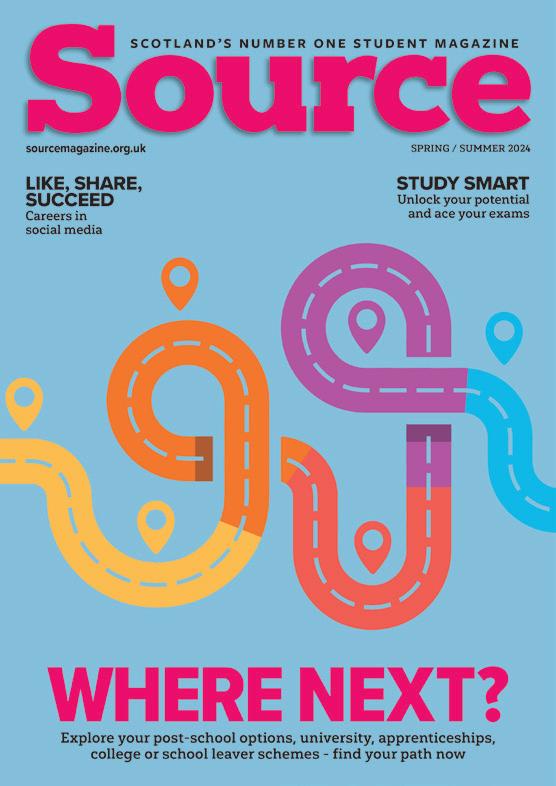


23
Navigating
Learn


25
20
8
15
You
30
Take
13
How

Stay organised with our handy calendar



24
THE SQA EXAM TIMETABLE BEGINS

Exams officially kick off today – it’s time for all your hard work and studying to pay off.
MAY
6
29 APRIL
MAY DAY HOLIDAY
26
SCHOOL’S OUT FOR SUMMER
It’s officially time to relax and enjoy some well-earned time off. We hope you have plenty of fun this summer.

There will be no classes or exams today. Enjoy a much-needed rest from your exam timetable.
24-27
HOLIDAY WEEKEND
Schools across Scotland are closing for the long holiday weekend. Here’s hoping for some sunny weather!



END OF SQA EXAM TIMETABLE

6
SQA EXAM RESULTS DAY

Exams are officially over for the year – hooray! The summer holidays are just around the corner.

Always double check term dates for the council you live in
14 12-13 JUNE AUGUST

The big day is finally here. Even if your marks aren’t what you expected, you should still be proud of yourself. There’s plenty of roads to success and exam results are just one of them.
IN-SERVICE DAYS

Today your teachers will return to school to prep for the year ahead. Luckily, you get two extra cheeky days off.
BACK TO SCHOOL
It’s that time again –the start of a brand new school year. Good luck!



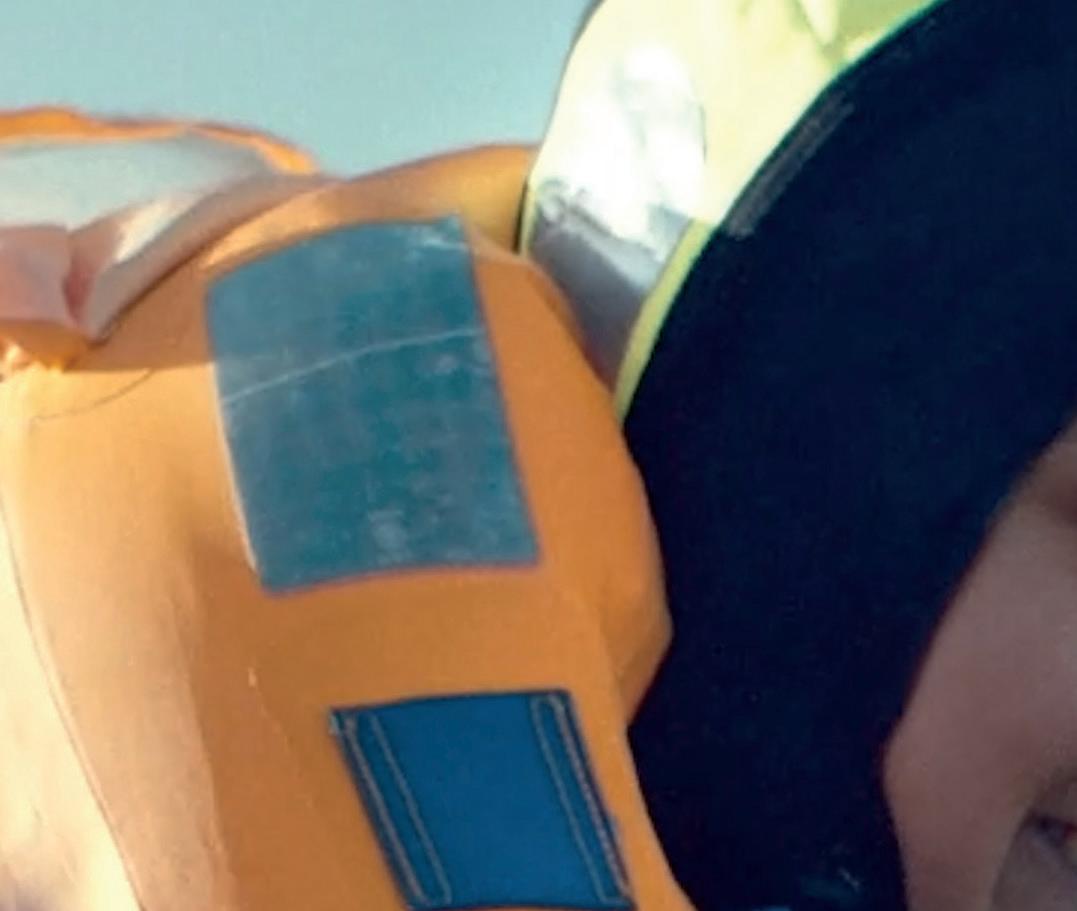
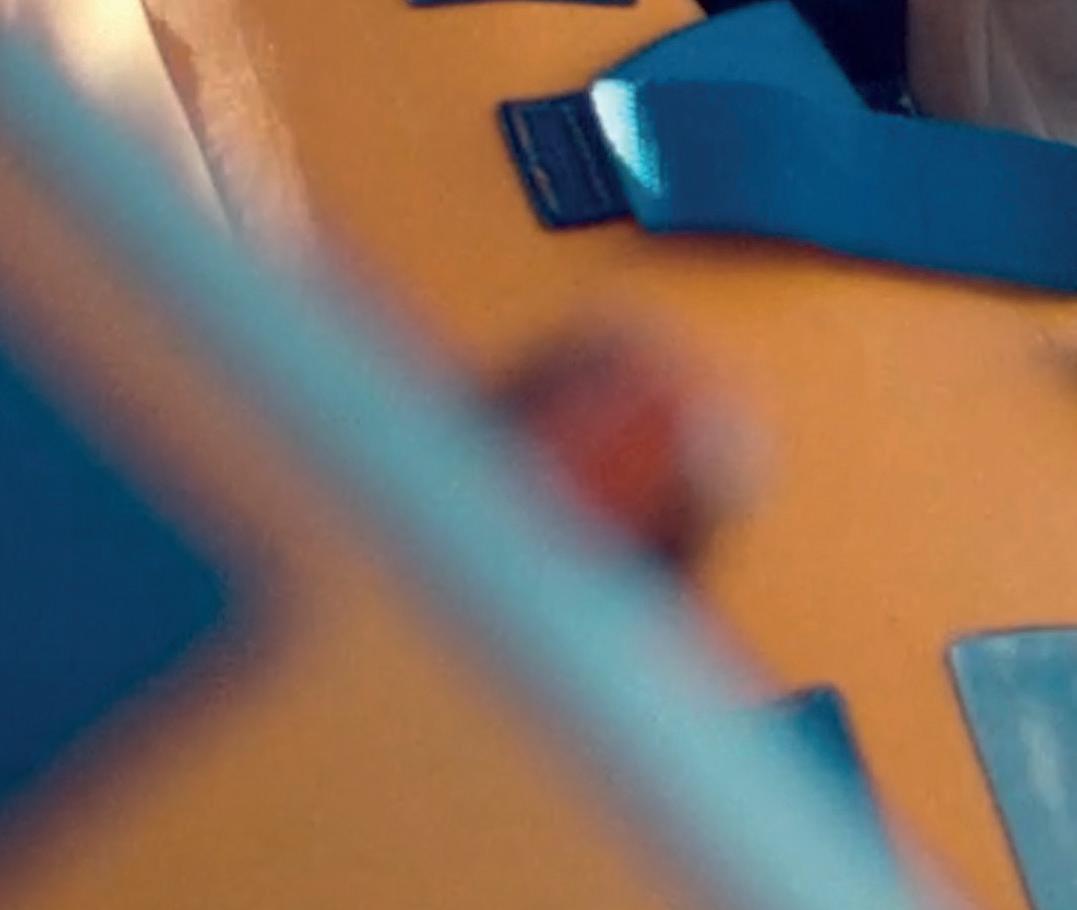



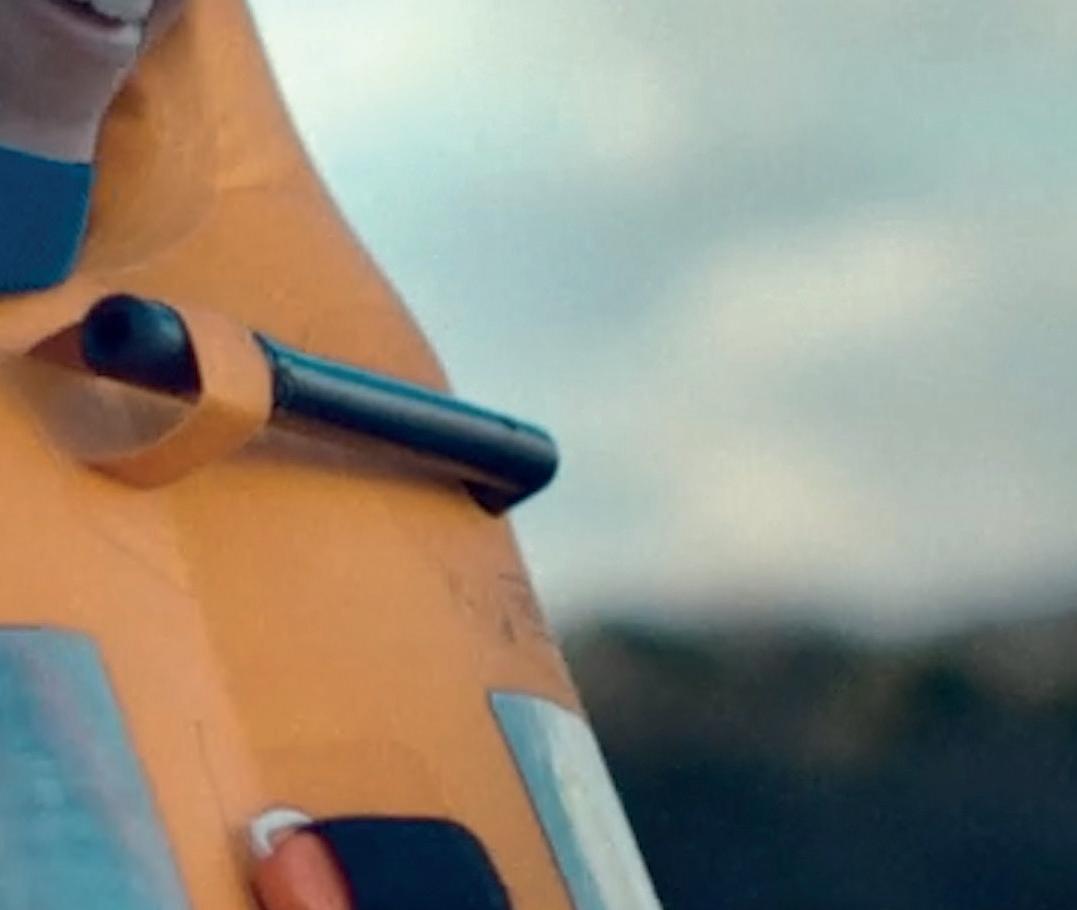








Whether you’re continuing your education or entering the workforce, we outline your options when it comes to life a er school
Wondering what to do after you leave school? Not sure what path is best for you? Don’t worry; you’re not alone!
Whether you’re thinking about going to university or college, eager to jump into working life, or considering a school leavers’ scheme or apprenticeship, it’s time to explore the possibilities.
PERFECT FOR:
School leavers or people who want to study a full degree.
If you’re looking to take the traditional route into higher education, it’s time to start thinking about your UCAS application. Any extracurricular activities or volunteering work you do will give your personal statement a boost, plus they’ll show universities how committed you are to your chosen area of study.
There are thousands of courses you could enrol in, covering all sorts of subjects, from law and business to dentistry and medicine. For some degrees, you’ll need to study longer to qualify, and you might have to take a postgraduate course or exams once you start working. Head to www. ucas.com to learn more about your options.
If your results don’t work out like you’d hoped, you could still attend university. Your results don’t control your entire future, and there are loads of options open to you. You could attend college to complete some additional qualifications which may help you progress on to university, or apply through clearing
to secure a spot on another course. Speak to your careers advisor to discuss your next steps and see what your options are.
PERFECT FOR:
People who want to earn while they learn.
An apprenticeship is a great way to study and develop new skills while earning. There are no costs to join, and the government or your new employer will fund your place. This makes apprenticeships suitable for anyone who can’t afford to take time out of paid work for higher education.
Apprenticeships can help you unlock new doors and build a worldclass career, while also receiving a competitive salary. Better yet, the practical work experience you gain from an apprenticeship will enhance your employability. While some university graduates can struggle to find jobs after graduation, 92% of modern apprentices stay in work after they’re qualified.
There are hundreds of apprenticeships on offer across diverse sectors, like construction, accounting, hospitality, software engineering and social services. The Department for Education says the highest earnings for apprentices a year after their study were in engineering (£37,880), public services (£32,330), and manufacturing technologies (£35,600).
There are three types of apprenticeships in Scotland: Foundation, Modern and Graduate. Visit www.skillsdevelopmentscotland. co.uk to find out more about the options to help you kickstart your career.
Apprenticeships can help you unlock new doors and build a world-class career, while also receiving a competitive salary
PERFECT FOR:
Building skills, in-depth knowledge, a stepping stone to uni.
College is a great opportunity to gain in-depth and practical knowledge in your chosen field. With lots of courses at different levels to choose from, college study will help you prepare for a future job or gain additional qualifications so you can progress to university.
Many college courses are vocational and geared towards a specific career, such as hospitality, plumbing, or hairdressing. Vocational courses provide training for a specific job, and often involve working in a reallife setting. Once you qualify, you should be able to confidently join the workforce, having mastered the skills you need to succeed.
Not sure if college is for you? Attend a campus open day, and you’ll get
the chance to explore the facilities, learn more about courses, and meet staff and students. It’s the perfect opportunity to ask them all your questions and discover what student life is like.
Most colleges will also help you plan your career beyond graduation, and can sometimes use their industry contacts to help you get a job. You can apply to a course you’re interested in by visiting the institute’s website.
PERFECT FOR:
Someone who wants to jump on the career ladder immediately. Are you keen to start your full-time career adventure? Once you turn 18, you can join a school leaver programme and directly enter the
world of work. A typical scheme will last between one and five years and, in some cases, you can achieve qualifications while you work.
Like an apprenticeship, there are lots of benefits to going straight into work – plus you’ll be earning a wage while you’re learning. School leaver programmes also give you the chance to travel, meet new people, and gain the confidence and capabilities that come with learning from experienced colleagues.
Barclays (search.jobs.barclays), KPMG (www.kpmgcareers.co.uk), and Deloitte (www.deloitte.com) all offer schemes to help you start your professional career. Deloitte even provides an alternative path to university with its apprenticeship and gap year programmes.
If you’re unsure about your next steps, Skills Development Scotland can help via www.skillsdevelopmentscotland.co.uk or their helpline on 0800 917 8000.
You don’t have to get a regular job when you leave school. Here are just some of the weird and wonderful careers out there that you can explore!

f the thought of getting a ‘normal job’ makes you shudder, don’t worry –there’s plenty of weird career opportunities out there that are off the beaten track. Here’s just a few ideas to get you thinking outside the box about your future!
If you’re sick of bogus plots and cheesy dialogue when you play video games, why not try and do better yourself? To become a video game writer, look up game related courses in college or university and pick those that offer specialisms in narrative and interactive media. Also remember to play and keep up to date with the latest games – for research, of course!
In the UK, over 60% of individuals report having considered pursuing a weird or unconventional career path at some point
This one isn’t easy, but if you’re passionate and determined, you may have a shot. First, you must speak English fluently and have a good handle on Russian (it’s one of the official languages of the International Space Station). Then, you will have to obtain a university degree in STEM, be in the best possible health and rack up relevant experience, such as putting in over 1,000 hours in a high-performance aircraft like a fighter jet. After that, it’s a lengthy screening process that can last up to 17 months.
Just like humans, animals sometimes need a little help and support too. First, get yourself an animal care qualification and put in time volunteering at your local animal shelter. Keep up to date with the latest developments in animal training but be careful – there’s lots of misinformation out there that is harmful to both animals and humans. If you want to diversify your business, you could take a course in counselling and psychology to provide animal-assisted therapy to humans.
No, it isn’t just a made-up job for the movies – bomb disposal experts are very real and needed. During wars, lots of bombs and landmines are dropped or placed but malfunction and don’t immediately go off. They can then explode much later when accidently disturbed by innocent civilians. BDE work out where the bombs might be and safely dispose of them before that happens. Many BDE’s start their careers in the armed forces before leaving active service and becoming private consultants for specialist organisations.
Bottoms up! To do this job, do a college course or degree in food science and learn everything you can about beer brewing. Then, educate yourself in flavour profiles and develop your palate. Then, try and get an entry level role at your local brewery and keep an eye out for quality control and sensory analysis jobs. But beware – to do this role, you must promise to only drink one type of beer ever and not to eat spicy foods in order to protect your taste palate!
If you want a rewarding & fulfilling career,
Nature related jobs are growing fast in Scotland.
From expanding our woodlands and restoring our peatlands, to marine conservation and renewable energy, there’s no better time to get involved with Scotland’s journey to become nature positive by 2030.
You could be a part of it…






Scotland Conservation O cer (Marine Conservation Society)
On a mission to bring about positive change for Scotland’s marine environment by sharing how important our seas are, fighting for initiatives like banning single use plastics and highlighting the issues of marine pollution.





Rainforest and Peatland Project O cer (Forestry and Land Scotland)
Working in the great outdoors and on the front lines, battling invasive species like the notorious rhododendron in Scotland’s rainforests and working to protect peatlands, which store lots of carbon from the atmosphere.
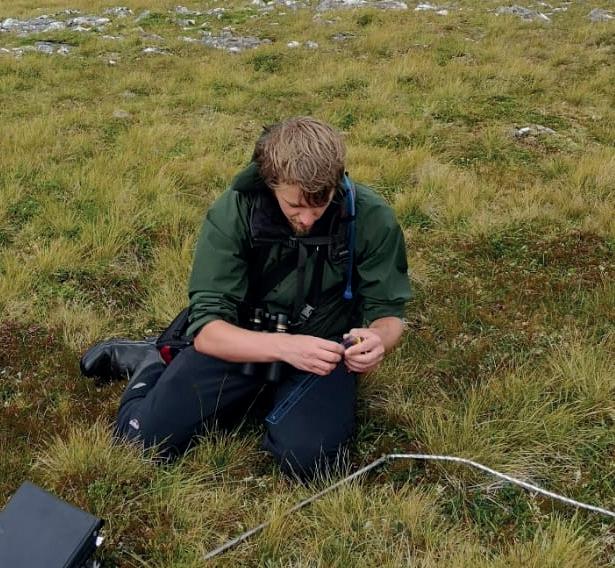
Ecologist (Self-Employed)
Be a guardian of nature by unleashing your expertise to explore and understand plants, wildlife and habitats in the stunning landscapes of the Highlands and Islands of Scotland. It’s like being a superhero for nature!

 Eszter Domina
Eszter Domina
Eszter Domina
Catherine Gemmell
Eszter Domina
Eszter Domina
Eszter Domina
Eszter Domina
Catherine Gemmell
Eszter Domina
You may be dreading exam season – but it doesn’t have to be as tough as you think. Changing the way you study could be the easiest road to success
You know that old saying, ‘the definition of insanity is doing the same thing over and over again and expecting different results’? Well, that applies to studying too. There’s no point continuing with a study method if it’s just not working for you.
Some students find studying easier than others, but no matter how you feel about it, there are probably a few ways to make your study hours a bit more efficient. Push your boundaries and try some of these study tips – they may be a total gamechanger for you!
Whether preparing for one exam or several, you might feel like you’ve got a mountain in front of you. It can seem quite daunting at first, but if you break things down into small chunks, it’ll become much easier to manage.
One of the best ways to tackle your workload is to start early. Give yourself enough time to study each subject thoroughly so you’re not rushing at the last minute. By preparing in advance, you’ll be less stressed during the exam run-up and feel more confident about your abilities.
Exams can cover anything from small topic areas to much broader ones. Why not create a study plan or schedule to ensure you study each area on time? By mapping out your days and weeks, you’ll see exactly what you’re learning and when.
When creating your schedule, think about the times of the day you work best. It’s better to get up early and revise when your brain is fresher, but this doesn’t always suit everyone. Do what works best for you but try to limit your late-night sessions – an overtired brain will only hold you back!
There are lots of different study techniques out there, and what will suit you might not suit someone else. If you’re finding that the way you’re studying just now isn’t working – don’t panic; there are lots of other methods you can try.
Here are some examples of popular techniques to help you study smarter:
• Use flashcards
It can seem quite daunting at first, but if you break things down into small chunks, it’ll become much easier
• Draw mind maps
• Talk to yourself
• Try the Pomodoro study technique
• Paraphrase your work
• Test yourself and try a practice paper
There are also various apps and websites dedicated to streamlining your studying, like Quizlet (www.quizlet.com) and BBC Bitesize (www.bbc.co.uk/bitesize).
Revising for tests can be challenging and a real struggle for some people. If you’re finding studying particularly difficult, you can talk to a teacher about additional learning support. They’ll be able to give you some advice or point you in the right direction.
Setting some study goals allows you to plan ahead and use your time more effectively. You are also more likely to stick to your schedule and be more productive.
Think about what you can reasonably achieve each day and go from there. You could set goals per day or per week – whatever you think will motivate you more. Just remember to be realistic when setting goals –being overly ambitious may set you up for failure and leave you feeling demoralised.
Study groups are popular because they encourage students to commit to a time to revise and stop procrastinating. Working in a group can help keep you on track if you don’t distract one another. Some students learn faster when working with others instead of by themselves. Tackling problems together can also help save time, especially when every minute counts.
While studying for hours on end seems like a good idea on paper, it’ll do you more harm than good. Studying endlessly will tire you out and limit your levels of productivity. It’s important to take quick breaks of 10 minutes or so throughout your studying to refresh your brain, boost your energy, and maintain focus and efficiency.
Preparing for an exam isn’t easy, it requires a lot of time, effort and hard work. Even just picking up your pen or opening your laptop will feel like a small victory some days; the key thing is that you’re trying. So, give yourself some things to look forward to, whether going out for dinner, a trip to the movies or even a day out shopping. Having fun things on the horizon will make studying easier in the long run.
If you take any tip on board, make sure it’s this one: just start studying. Stop procrastinating and start to revise; even if you start small, you’ll be over the first hurdle, and your exam won’t feel as scary.
It doesn’t matter what you do or how you do it; it’s just important to begin preparing for your exams. You’ll feel so much better once you do!

With over 20 Higher Education and 30 Further Education programmes our doors are always open. We create MORE OPPORTUNITIES and REAL EXPERIENCES that support our communities with up-skilling and progression in flexible ways.
Discover more at our Open Day, Tuesday 11 June, 3.30pm - 6pm or visit moray.uhi.ac.uk
Life can be stressful, and it can be hard to maintain balance when things get tough. Looking a er yourself is key to physical and mental wellness
Being a student can be fun and exciting, but it also has its challenges too. You are at a time in your life when you are making tough decisions about the future, all while juggling your studies and other life responsibilities. It’s understandable to feel stressed out and anxious, and it’s important that you take time out to look after your mental health to ensure that the pressure doesn’t get too much.
We’ve put together a helpful guide that you can use whenever things start to feel too much. Take a beat and try one of our suggestions - it might stop you from feeling so overwhelmed!
In a world of TikTok and endless Netflix sitcoms, it’s easier than ever to procrastinate. While you deserve time off to relax, you need to keep tabs on what you have coming up so that you don’t have to pull an all-nighter writing an essay or cramming last minute for an exam. Sit yourself down with a date planner and write up all the important deadlines and events you have coming up over the next few months. Remember to check it every week to ensure that you don’t forget anything important. This will help you feel in control and on top of your schedule.
You could also download the Google Calendar app onto your phone, so you’ll always know what you’re doing. All you need to do is set up a free Google account, and you’re good to go.
Sometimes you have to be tough with yourself to be kind. That means ditching late night Xbox sessions to get a good night’s sleep or hitting your daily 10 thousand steps goal to keep yourself physically fit. Looking after your body can help look after
your mind, so eat plenty of nutritious meals, stay hydrated and move around whenever you can. It might be a total chore in the moment, but you’ll end up feeling more alert and capable in the long term.
It’s great to have a strong work ethic, but sometimes we can burn ourselves out by pushing ourselves too hard. If you’re working on an important project or piece of work, remember to plan in plenty of breaks. Look up the Pomodoro method to help break up your work and remember to take time to do one thing every day that you enjoy. That can be going to the cinema with friends or reading your favourite book – whatever it is, make sure you always take some time for you.
Despite our best efforts, sometimes it can be really hard to look after our mental health on our own. If you’re trying your best to feel better and nothing seems to work, it’s probably high time to talk to someone you trust and ask for help. That can be a friend, family member, teacher, or your GP. There is always help out there, and you don’t have to go through it alone. If you’re worried about speaking to someone in person, you can text ‘SHOUT’ to 85258. Shout is a free 24/7 text messaging service that can support anyone struggling to cope.
If you would like to talk to someone about your mental health Youth Scotland (www.youthscotland.org.uk) and YoungMinds (www.youngminds.org.uk) offer a wide range of services to help support your mental wellbeing.

What are the benefits of choosing the college route to a degree?
Save money by studying closer to home
Gain the same university degree in the same amount of time
Take your studies one year at time

Achieve a recognised qualification for every year of study
Opportunity to gain direct entry to 2nd /3rd Year of a Degree from an HNC/D
Study some degrees in full at Fife College
With more than five billion users worldwide, social media apps have never been more popular. So how can you make a career out of them? Sco ish social media stars
Graeme Tomlinson and Abbie Blyth – who have almost 3 million followers between them – share their experiences
In the digital age, social media influencers and content creators are a big part of our world. The opportunities for an online career are endless, then of course there are the book deals and media appearances… So how do you get started?
Graeme Tomlinson, more commonly known as The Fitness Chef, uses his platform to teach others about health and nutrition.
Now 36, Graeme reveals it took him years to figure out his career – he spent most of his time at high school focused on becoming a professional cricket player. In hindsight, he wishes he’d thought more about it, but confesses he didn’t understand his options.
“I didn’t take school seriously enough or understand how my careers advisor could help me,” he says. After high school, Graeme –who’s from Aberdeen – went on to study history at university. He took a break to go to a cricketing academy before eventually returning to his degree, which he said was the “biggest waste of time”.
“I didn’t want to do it,” admits Graeme, “I did it just to complete it. I didn’t understand this then, but if you start something and it’s not for you, you’ve got plenty of time to change it. I was 32 when I finally found something that was right for me.”
When it comes to social media, the world has learned to expect the unexpected. Even now, Graeme says the success he’s had is “mind-boggling” –social media didn’t even exist when he was at school. Back then, he never dreamed he could make a full-time career out of posting health and fitness videos online. “I was always of the mindset that you had to go to university,” he reveals. “I think, previously, you did. But these days, the opportunities for someone who doesn’t want to go are endless.”
Social media is far from an easy career though. “Creating a 90-second reel can take anywhere from six to 12 hours, which is ridiculous,” explains Graeme.
If you’re ready to put in the hard work and graft, Graeme says: “Think
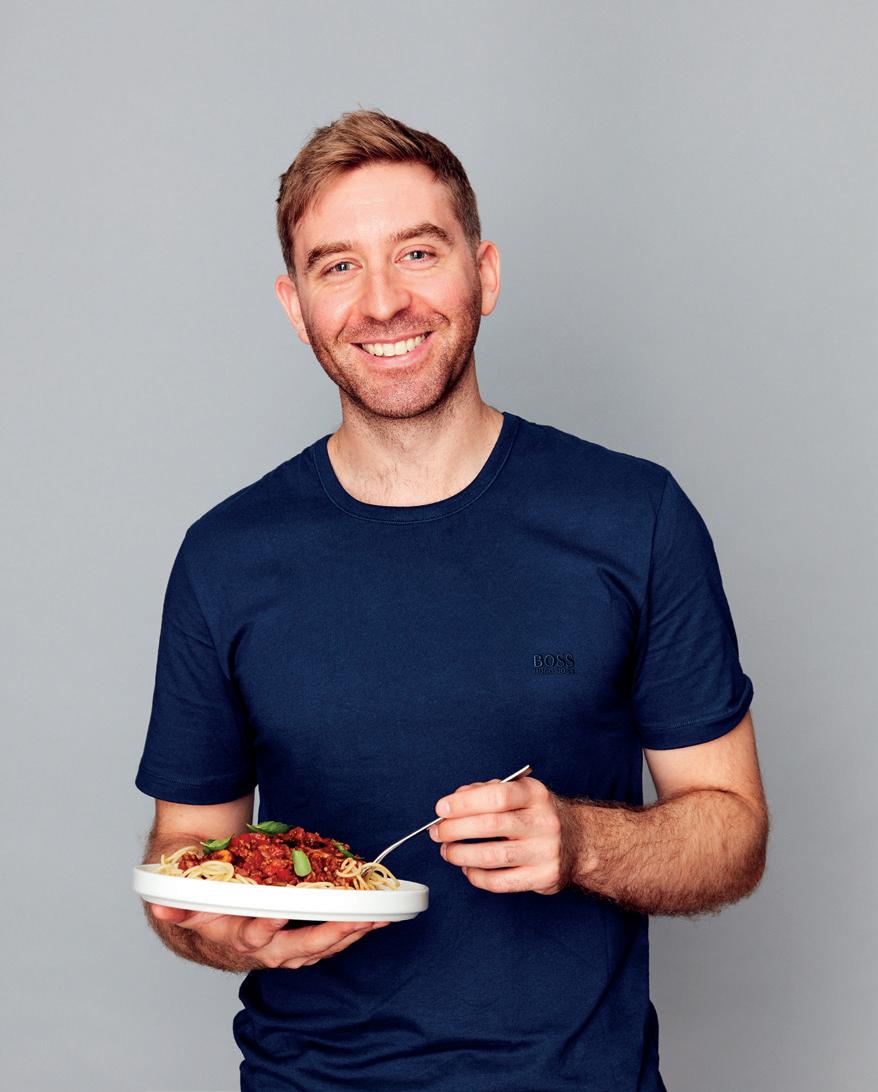


Grab every opportunity you get… you just don’t know where it will take you
about what type of content you’re posting and make sure you’re wise about trends.” Posting regularly and being authentic will help you find your audience and develop your brand.
“If you look at anyone who’s built a large following, they’ve done it by being themselves or having their own message,” he explains.
Abbie Blyth, a 29-year-old blogger and influencer from Glasgow, started posting on social media as a makeup artist looking to build her profile and portfolio online. After realising she could make a career out of makeup – and then as a social media personality – Abbie decided to do something she loved, instead of following a traditional path.
“I never planned to do this job; I’d wanted to go to university to be a primary school teacher,” reveals Abbie. “But I made a career for myself as a makeup artist, which led me to the job I’m doing today. I saw that it was starting to pay off, so I decided to stick with it because it’s what I enjoyed.”
Known for her signature blazers, Abbie also launched her own clothing company – BLY Label – after the clothes she designed with other brands repeatedly sold out. “Running my own business can be very stressful, and I’m learning a lot on the job,” she admits. “It comes with its ups and downs, and I’ve made mistakes, but I’ve also made decisions that have really paid off.”
Since her rise on social media, Abbie has enjoyed exciting experiences, including filming for the popular BBC show Agency: Unfiltered. Like Graeme, she says if you’re serious about social media, you need to take advantage of every opportunity you’re offered.
“You’ve got to try everything and be yourself. There will be things that will work and things that won’t,” explains Abbie. “Grab every opportunity you get and every experience that comes your way… you just don’t know where it will take you.”
If you don’t fancy the pressure of needing to be “on” all the time, there are other roles you can consider in the social media realm. Social media managers support brands to come up with, create and schedule content, while a marketing qualification could open the door to helping companies with their promotional strategy.
Copywriters write adverts, website words, social captions and email newsle ers using persuasive language, plus there are other BTS roles like videographer, content creator, app developers, and even performance data analysts.
































































It’s easy to fall in love, but not always as easy to spot early warning signs of a toxic relationship. Here’s how to know if your new relationship is a winner
The beginning of a relationship can feel wonderful. It’s a time full of excitement and anticipation, and it’s easy to be swept up in the romance of it all.
When you’re in a love bubble, it can be hard to see problematic behaviour for what it really is. It’s important to be able to spot the signs before your relationship becomes unhealthy without you even realising.
Having respect for one another is crucial in a relationship. You must value your partner’s time, feelings, opinions, and needs. Giving one another the freedom to express yourselves builds the foundation of a strong relationship. It shows that you love one another for who you are.
Your partner should also protect your privacy and personal information. If you believe your boyfriend or girlfriend has shared your private information without your permission, contact Citizens Advice (www.citizensadvice.org.uk). It is never okay for someone to share intimate photos or videos online –it is punishable by law. If this happens to you, you should report it to the police.
You have to talk openly in a relationship and listen to each others problems. If you can’t discuss your feelings without it ending in a screaming match, then you might be in an unhealthy relationship. Every couple experiences its difficulties, but it’s how you handle them together that matters.
If you believe your partner is or is on the verge of being mentally or physically abusive, then you can call the national Victim Support

(www.victimsupport.org.uk) phone line on 08 08 16 89 111. They’ll protect your confidentiality, keep anything you tell them private, and can request support on your behalf.
A relationship is built on trust. If you can’t trust your partner, then you will never be comfortable in your relationship. You have to be able to believe one another without needing to prove yourselves.
Whilst, you should be honest with one another, you don’t need to disclose everything. You can keep some things private as long as you remain loyal to your partner.
Knowing the boundaries of your relationship and trusting your partner to respect them from the beginning is essential. You can’t be in a healthy relationship with each other if you’re not on the same page.
A healthy partnership is 50/50 – you should have an equal say in your
relationship and your decisions about it. You should hold one another to the same standards, respect each other’s feelings, and never force one another to do something uncomfortable.
If your partner is exerting control, ignoring your boundaries, or pressuring you in any way, your relationship has become abusive.You can phone the National Domestic Violence Hotline (www.thehotline.org) on 7233 or text “START” to 88788 to talk about your situation and discuss your options. In extreme circumstances, always phone 999 for emergency help first.
FIND OUT MORE
Anyone can find themselves in an unhealthy relationship, male or female. If you think your relationship has turned toxic or is becoming dangerous, you can talk to one of The Spark’s (www.thespark.org.uk) professional counsellors about your concerns. You can phone their free helpline on 0808 802 2088
UNDERGRADUATE OPEN DAYS 2024
Saturday, 28 September and Saturday, 26 October
Our courses are designed to make you career ready. You matter to us, and, at our modern campus, you will benefit from excellent support. As a student at QMU, you will grow and you can go far.
Find out more at our open days.
Business
Education
Health Sciences
Media, Communication and Creative Industries
Performing Arts
Psychology and Sociology
Book your place now
More info: www.qmu.ac.uk


Managing your money can feel overwhelming at first, but it’s important to take control of it before it controls you. Learning to be money-wise now will help you to prepare for the future




Whether you’re living at home or in halls, budgeting will be essential during the academic year. Prices are continuing to rise, so your money won’t stretch as far as it used to. Planning ahead, shopping smart, and taking advantage of discounts will help you stay on top of your bills.
Free online calculators from banks like Santander, Lloyds and HSBC can help you track your income

and expenses and avoid any big surprises. With the help of these handy tools, you can prepare for the month ahead and be more moneywise.
Most businesses will offer a student discount these days as they recognise that students aren’t able to earn as much as full-time workers. Discounts tend to be a percentage off the total price, but they sometimes

include free trials or buy-one-getone-free offers. It really does pay to shop around.
From eating out to shopping and even gym memberships, there are hundreds of discounts to take advantage of. Sign up and verify your student status at MyUnidays (www.myunidays.com) and Student Beans (www.studentbeans.com) to stay on top of the best deals. Once



verified, you’ll get tailored discounts based on your favourite brands.
Your Young Scot NEC Card also offers discounted travel and savings across thousands of retailers and venues in Scotland. You can apply online at getyournec.scot for a free card.


The Royal Bank of Scotland and NatWest offer all students opening a bank account a four-year Tastecard giving 50% off your food bill (or 2 for 1 meals) at selected restaurants, and discounts on entertainment and shopping. Santander does not have as large an overdraft for students as other accounts, but it does come with a free four-year railcard worth £100, which will appeal to commuting students.

Monzo and Starling Bank aren’t student accounts, but they have some great budgeting features. Both banks have saving pots where you can put money aside to help you save. You can have multiple pots on the go at once and customise their names and images.

From eating out to shopping and even gym memberships, there are hundreds of discounts to take advantage of

Working part-time could give you some financial freedom and even create a bit of disposable income. Having some extra money will alleviate your financial stress and give you the spare funds to have fun. Being a student is a lot of hard work, so there’s nothing wrong with going out for lunch with your friends or rewarding yourself every once in a while.
Students in Scotland can apply to The Student Awards Agency Scotland (SAAS) for bursaries and loans. The amount of money SAAS will award you depends on your household income and personal circumstances. Some students might be eligible for a bursary of up to £2000 that they won’t need to repay. Young students can apply for a loan up to £7,000, which increases to £8,000 for independent students.


SAAS also offers a variety of living cost grants for students who might require extra support or help, including the Student Carers Grant, Dependants’ Grant, Lone Parents’ Grant and Lone Parents’ Childcare Grant.


Plus, in the work place you’ll learn new and transferrable skills that you’ll be able to put to use after you graduate. Even if your part-time job is unrelated to your future career, it can still add value to your CV and help you get a graduate job.

You may also qualify for an additional grant if you are on a specific course like nursing that you do not need to pay back.

If you’re unable to manage your workload as well as a part-time job, why not think about finding one for the summer or a paid internship? You can spend your time off saving up so you’re not as worried come autumn time.

Money-saving apps like Emma (emmaapp.com) and Plum (withplum.com) can help you track your spending. You can connect your bank accounts to the apps, and they’ll tell you where you’re overspending each month. By looking at your transactions, Plum can even tell you if you’d be cheaper shopping elsewhere.

Managing your money in the current climate can be tricky and not to mention scary. But thankfully, support is available, and a range of experts are ready to help. Organisations like the Money Saving Expert (www.moneysavingexpert.com) and MoneyHelper (www.moneyhelper.org.uk) have a range of tools and resources on their website that you can look at to help you budget. You can also contact your local Citizens Advice Bureau if you require more support.
For more financial help and advice, speak to student services at your university, college or school. In extreme cases, a university may grant you a oneoff payment from their emergency or hardship funds.



































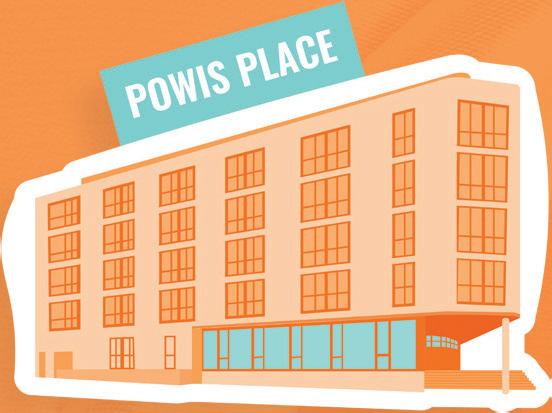



































































Leaving home to start university or college can be nerve-racking. You have to do your own washing (what?!), make new friends and try not to get lost on your way to class. We’ve rounded up our top tips to prepare you for higher education
Once you leave home your mum won’t be there to cook you roast dinners or separate the colours from the whites. Learning to cook your favourite meals and how to turn on a washing machine are essential if you’re making a big move. For tasty, stress-free meals (that won’t break the bank) hit up Mob Kitchen (www.mobkitchen.co.uk) for meals your flatmates will love.
Student life will provide you with great memories, but your bank account might not be as happy. Calculate your expenses before you start the first semester to avoid calling your parents for money two weeks after SAAS comes in. Try a Monzo (monzo.com) card to see just how much you actually spend in Tesco every day. Don’t forget to include things like toiletries, travel cards and change for the laundry room in your halls.
Make sure you turn up to your first lecture prepared! Pencil case? Check. Researching what books you need in advance can save you time and embarrassment. Your university book shop should stock everything you need but buying second hand on Amazon can save you some cash.
Over the summer holidays make a note of your class timetable, when and where you can pick up your student card and if you have to attend an induction week. You’ll thank us when you have more time to socialise during freshers’ week.
Once your place on a course is confirmed its time to get social. Check the freshers schedule for events and mixers or look

for a student fair in your city. A lot of courses start WhatsApp groups where you can meet new people who will be studying alongside you.
Researching contents insurance, finding a new GP and a dentist doesn’t sound very glamourous, but it is necessary. There’s nothing worse than having your phone, laptop or something sentimental stolen. Having contents insurance can protect you if you aren’t covered under your parents’. Registering with a new GP can be the difference between suffering with freshers’ flu and being smug while your flatmates have it.
Around three quarters of students feel the need to work while they study to
cover the cost of living and student life. Set a day aside over the summer to update your CV so that you are prepared if you want to apply for jobs once you’re at uni.
Summer is the perfect chance to relax, but sleeping in until two in the afternoon everyday won’t help you once your new classes start. Try and get into a routine a few weeks before you move to avoid angry lecturers and missing important notes.
FIND OUT MORE
For more tips on leaving home for higher education visit www.sourcemagazine.org.uk





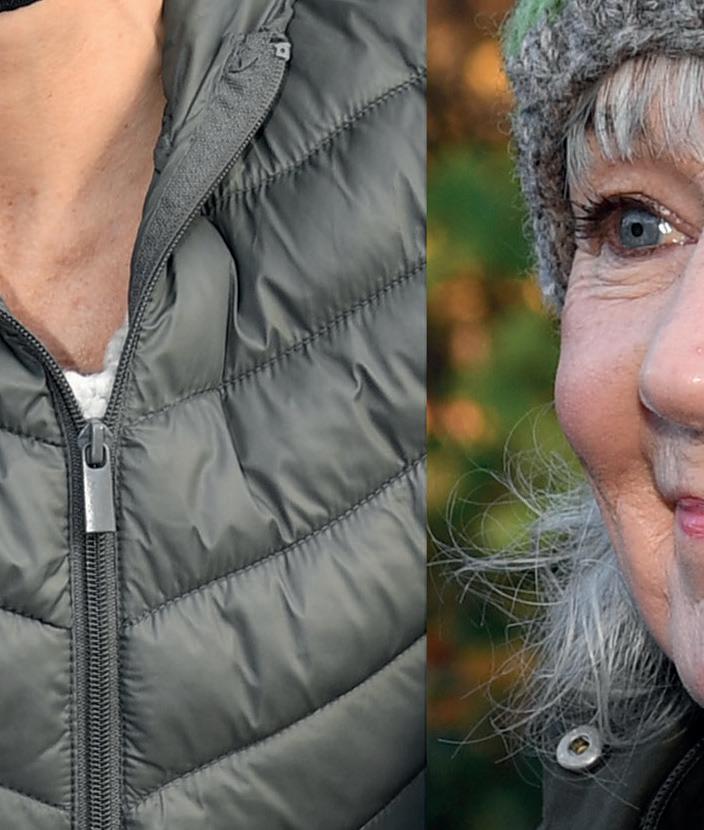
On our roads and in public spaces Let’s look out for each other




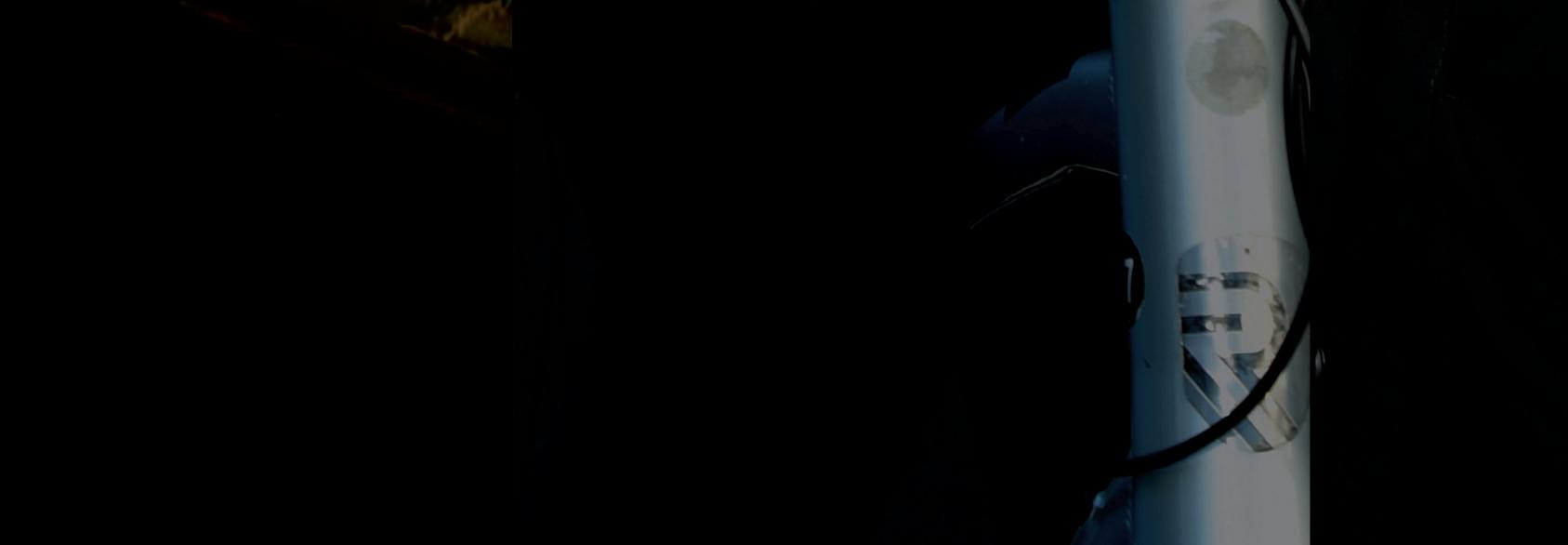






Summer jobs and volunteering allow you to explore the world, give back to the community, and boost your employability all at once. Here’s some of the amazing opportunities that will make your summer –and your CV– sparkle
Fancy spending a summer in the lush rainforests of Madagascar, helping protect native lemurs and lizards in their natural habitat? As part of SEED Madagascar’s conservation team, you can volunteer your time to help save animals and plants currently facing extinction. Volunteers carry out vital environmental research led by a team of conservationists, working with local Madagascan communities to raise awareness of the destruction of the rainforest. This is an ideal 2 - 8 week programme for those who love animals, protecting the environment, and doing field research. It also adds sparkle to university applications, particularly in subjects such as zoology, veterinary medicine, and biology. This is a pay-to-volunteer programme with prices starting from £795 plus expenses. Find out more at www.madagascar.co.uk/volunteer.


From the surf bars of the Cornish coast to pop-up restaurants at the Edinburgh Fringe, chefs are snapping up summer interns to help in their kitchens. There’s a huge need for hospitality staff in the summer months, as flocks of hungry tourists descend on our nation’s beauty spots looking for the best places to eat. Cafe Cùil on the Isle of Skye is a bustling eatery enroute to the island’s worldfamous Faerie Pools, and every year chef and owner Clare Coghill recruits budding chefs to join her staff. In
summertime, the cafe is so busy that queues often stretch out into the car park. “You’ve got to start somewhere, and even the best chefs start their careers washing dishes or helping Head Chefs plate up for service,” says Clare. “We love welcoming keen team members for the summer season. The cafe is a great place to learn the hospitality trade, from kitchen to barista work.” Find out about similar hospitality positions at www.workaway.com or visit www.cafecuil.com.
If you picture yourself as a trader, a data analyst, or an investment banker, a summer internship is a fantastic way to get your foot in the door of the fast-paced finance industry. Santander is one of the major global banks that offer yearly paid internships to the best and brightest applicants. Their 10-week programmes give interns an insight into commercial and corporate finance, allowing them to shadow senior employees and learn about everything from growth capital to real estate. They’re looking for summer interns who want to help shape the future of banking, so you should apply armed with enthusiasm and lots of ideas. These programmes are highly competitive, but offer invaluable experience that will wow potential employers. Check out available opportunities on the summer internships page at www.santander.com/en/careers.
If you’re daydreaming of a career in magazine journalism, firstly: we get it. Secondly, a summer editorial internship can really boost your skills and make your CV stand out from the crowd. Conde Nast, the company responsible for titles such as Vogue, Vanity Fair, and GQ, run annual summer internships in London that give aspiring journalists an amazing insight into fashion, media, and features. Experiencing the hectic atmosphere inside one of the most successful publishing houses on the planet, Conde Nast interns learn invaluable skills and set themselves up for an exciting career in publishing. So if you’re ready to live out your Devil-Wears-Prada dreams, keep an eye on the Conde Nast website for any available slots at www.condenast.com/careers. The Financial Times and other print titles offer similar internships, so it’s worth keeping an eye on them too.

Camp America is a great place to kickstart a career with children and young people. As camp staff you can spend the summer in the wild North American countryside, entertaining and supporting children from across the US on their summer break. You can spend the day kayaking, swimming, and singing around the campfire while at the same time boosting your confidence, communication and leadership skills. Combine that with the energy, enthusiasm, and responsibility required to work with Camp America and your future employability skyrockets. Check out camp opportunities here: www.campamerica.co.uk.
It jumped out to employers that I’d done so much summer charity work and was comfortable talking to lots of people
Glastonbury, Boomtown, Download… some of the UK’s best music festivals are manned by volunteers, from bar staff to litter pickers to shop workers. By signing up with a charity like Oxfam, you can provide volunteer services at your favourite festival and experience the music and atmosphere in exchange for your time. Oxfam has lots of volunteer options, from working in one of their on-site second-hand shops to raising awareness about climate action. Although you’re at the festival to have fun in your free time, the hours spent volunteering are contributing valuable work to the charity and also to your CV. Working with Oxfam and similar charities will help with any future third-sector job application, and you’ll get to watch your favourite headliners too. “It’s such a great way to meet people and gain experience of working for a charity,” says Holly May, a veteran festival volunteer who now works in the third sector. “It jumped out to employers that I’d done so much summer charity work, and was comfortable talking to lots of people.” Find out more at: www.festivals.oxfam.org.uk.









Discovering the Northern Isles has never been easier with NorthLink Ferries.
The comfortable and reliable service offers sailings from Aberdeen to Lerwick, Shetland, with regular calls into Orkney’s capital of Kirkwall. Alternatively travel to Orkney’s port of Stromness from Caithness. This 90 minute journey on MV Hamnavoe is the only sailing to Orkney which passes the iconic sea stack, the Old Man of Hoy.
Students in full time education are entitled to a 10% discount on passenger and vehicle fares.

Operated by
northlinkferries.co.uk


Shetland
Orkney




A gap year offers the opportunity to explore the world and gain life experience before you start the next chapter of your life
Agap year is more than a year off. It offers the chance to develop yourself before taking the next step in your education or career. Gap years give you the opportunity to focus on personal growth, gain new experiences and even travel before a new phase of your life begins.
Your gap year can take many forms. What you do is entirely up to you – from travelling to teaching, working or studying abroad, or even volunteering in wildlife care, conservation, with children, or in medical support. The options are endless.
A gap year can also equip you with skills for life. Many opportunities abroad will need you to fundraise for your trip which gives you useful
experience. And if you travel with an established gap year company like Project Trust, you’ll often get support with visas and immigration, insurance, and medical assistance.
You don’t have to go far to make the most of your gap year of course – there are volunteering opportunities across Scotland and the UK with charities like Guide Dogs, Who Cares? Scotland, Prince’s Trust and Barnardo’s, all of which will help enhance your skills, experience and employability.
Malisa Hatteberg had originally planned to take a year out after university. Now aged 24, Malisa works at Plan My Gap Year (PMGY) as their social media manager. She’s based in Sri Lanka and has already travelled the world and visited places she never expected… All because she took that gap year. It really took her out of her comfort zone: “It was
so scary,” she confesses, “but once I arrived at my first destination with PMGY and saw how kind everyone was, it became easier.”
For a while, Malisa wasn’t sure if she was doing the right thing. “We’re taught to do everything step by step, but it’s perfectly fine not to,” she reveals. “My friends back home are buying houses and having babies. My bank account is empty,” she laughs, “but, for me, it’s all working out.”








Malisa has enjoyed some jam-packed years full of self-discovery and new experiences. She started her gap year in Peru, where she volunteered at a dog rescue and a wildlife sanctuary. Living in South America was an eyeopening experience for Malisa, as she learned first-hand how the world isn’t equal for everyone. “I’ve got a broader perspective now from learning about these differences,” she says. “It’s been really rewarding.”
After her time with PMGY in Peru, Malisa continued backpacking around South America. She did some stints in workaways to fund her travels, including three weeks on a horse ranch and two weeks working in the mountains in Chile.
Moving from one place to the next can be lonely, especially when you’re by yourself. “It can feel like everyone around you already has friends,” she admits, “but you’ve got to put yourself out there and say hi.”
By being brave, Malisa’s made lifelong friends, met her boyfriend, got her dream job in social media, and studied Spanish at a South American university. After her time in Latin America, where she witnessed the spectacle of Argentina

winning the World Cup, she worked for five months in Bali with PMGY. Malisa met hundreds of volunteers on various programmes in Indonesia before moving to her current base in Sri Lanka.
With the help of PMGY, Malisa has worked with children, taught English, completed medical and mental health volunteering, and visited India and Nepal. She’s had a wide range of experiences and loved almost every minute.
“There have been aspects of my travelling and volunteer work that haven’t been great,” she told us, “but it’s taught me so much. I used to worry about catching trains and crossing borders but, with time, I became more confident.” Then there’s the issue of missing loved ones back
home. Malisa does miss her friends and family, and sometimes wonders if she’s doing the right thing. “But when I’ve gone home and asked my friends what I’ve missed, there’s never really been anything new,” she smiles. “Living and working abroad comes with challenges, but it’s worth it.”
Busy planning her next move, Malisa is thinking about moving to Colombia with her boyfriend. If she hadn’t taken a chance and done something different after university, this sort of adventure would never have crossed her mind. “Just be brave and do it,” Malisa advises anyone considering taking a gap year. “If you don’t like the experience or it’s not what you expected, you’ll still grow so much as a person. You’ll never regret it.”
Living and working abroad comes with challenges, but it’s worth it”
Malisa Hatteberg
FIND OUT MORE
Plan My Gap Year: www.planmygapyear.co.uk
Project Trust: www.projecttrust.org.uk
UCAS advice: www.ucas.com/discover/gap-years
Volunteer Scotland: www.volunteerscotland.net

Time for a study break. Get away from your desk and put your headphones on – it’s podcast time!
Podcaster Blindboy
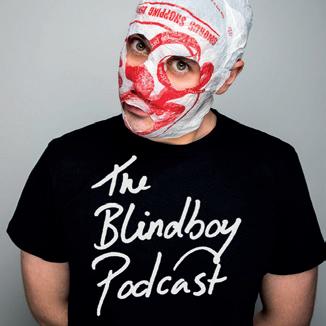

Boatclub is an Irish writer and musician who wears a plastic bag on his head to protect his anonymity. That might sound a little strange, but once you listen to a couple of episodes of his weird and wonderful podcast, you’ll begin to understand his quirky, off-kilter view of the world. Every week he tackles a different topic, be it mental health or the surprising Irish history of KFC chicken. Much is made of Blindboy’s entertaining ‘hot takes’, but we think it’s the warmth of his personality that keeps audiences coming back for more.
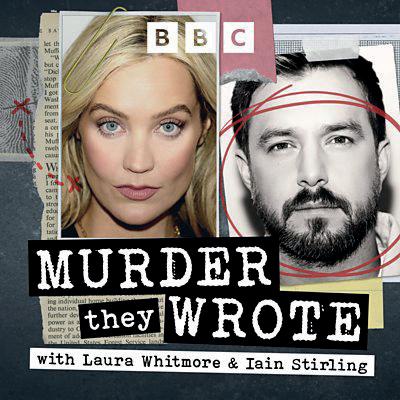

Laura Whitmore and Iain Stirling take a deep dive into some of the world’s most jaw-dropping true crime stories. Each week, the pair discuss a new crime and all the shocking details on the podcast. They unpick all the crucial moments to get to the heart of whodunnit, and still manage to make each other laugh along the way. If you have spent your free time thinking about the Maple Syrup Heist or have lost sleep over the case of The Hitman Dentist, then this podcast is for you.

This one-off audio drama starring Christina Ricci as Harley Quinn and Billy Magnussen as ‘Patient J’ tells the story of how this infamous couple met in Arkham Asylum. Even people who are not hardcore fans can enjoy this story of a woman trying her best to do the right thing in tough circumstances, and even kind of understand why she eventually snaps and disappears with the mysterious Mr J. If you’ve never delved into audio storytelling before, this is a great entry point to the genre.



This is a podcast that does what it says on the tin – it talks about the climate emergency and what we can do to stop it! Every week the hosts delve into the most pressing environmental issues of our time and speak to expert guests from various fields about their knowledge base and what they think we should all do next. Sometimes the climate crisis can leave us feeling scared and overwhelmed, but podcasts like this help listeners feel empowered to get out there and make a difference.


Do you ever catch yourself pondering the very fabric of the universe? Have you ever wondered if your pet really loves you back, or if you had what it took to outrun a T-rex? The WHY? podcast is all about asking those tricky questions that only occur to you on long car journeys or when you’re trying to fall asleep at night. Speaking to experts who work on the very frontiers of modern science, WHY? asks why so you don’t have to..
Before you write history off as dreadfully boring, give You’re Dead to Me a try. The podcast is a comedy show created by Greg Jenner, who worked as a historical consultant on the Horrible Histories TV series. Every episode he invites a historian and a comedian on to talk about all things history. The show puts a fun new spin on historical topics you might think you know everything about, like Egyptian queen Cleopatra, to cool things you might not be aware of, like Victorian bodybuilding.
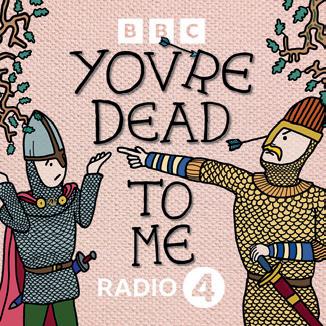

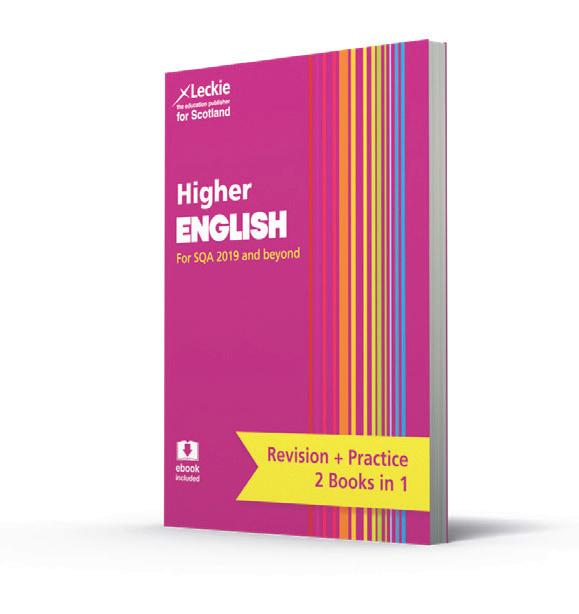

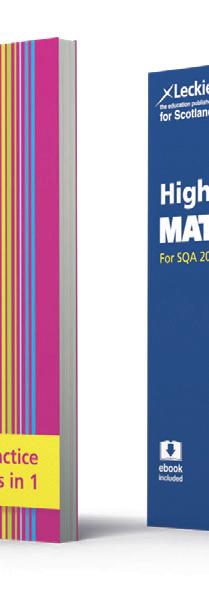
Key questions highlight crucial concepts and techniques
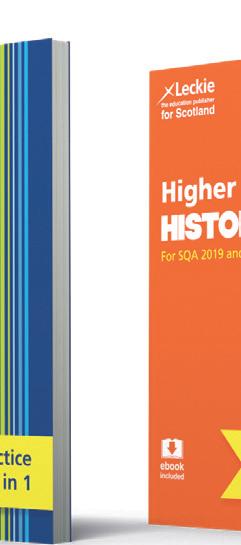


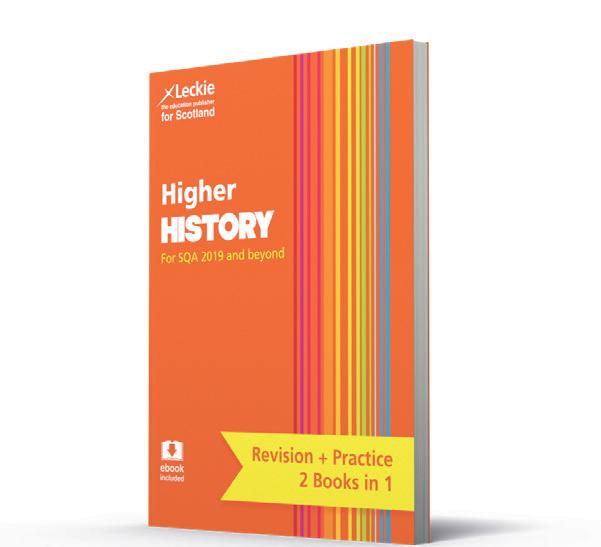
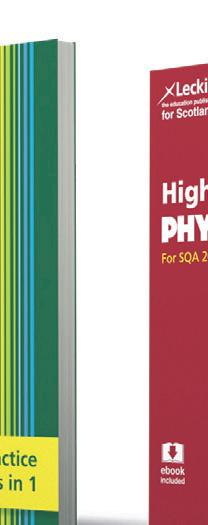
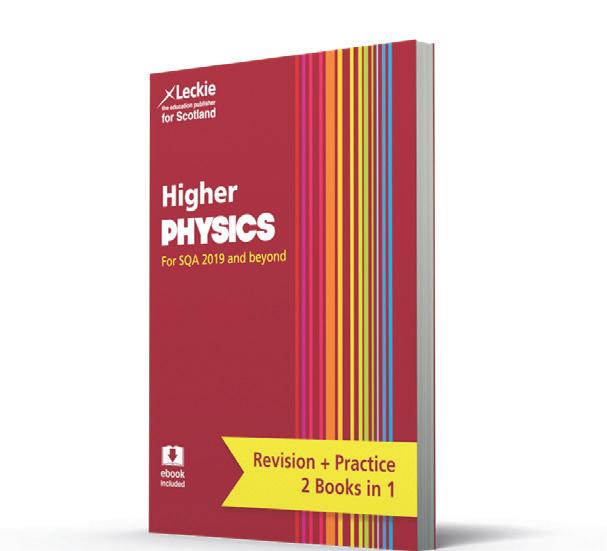
Students Books


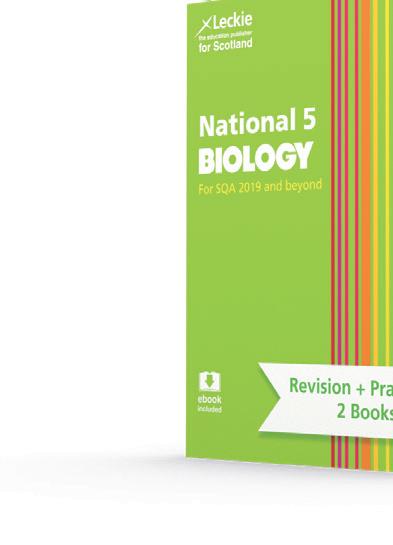











Practice Workbooks


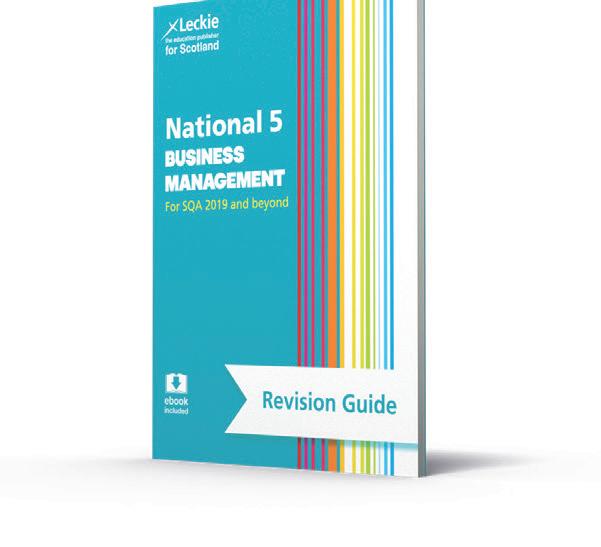
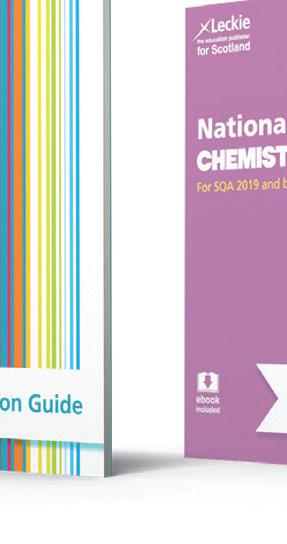

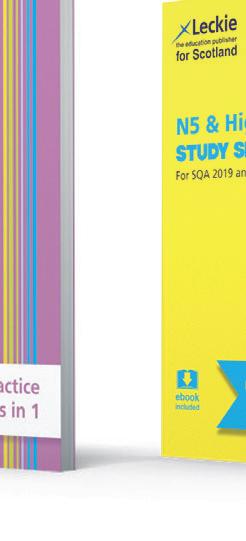
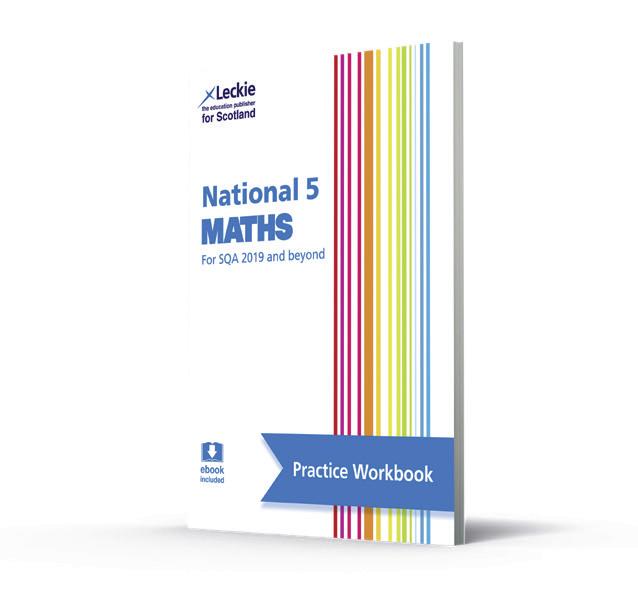




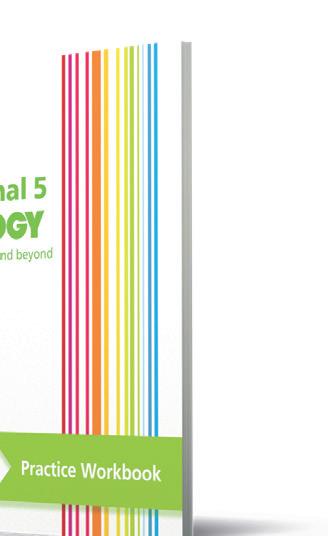






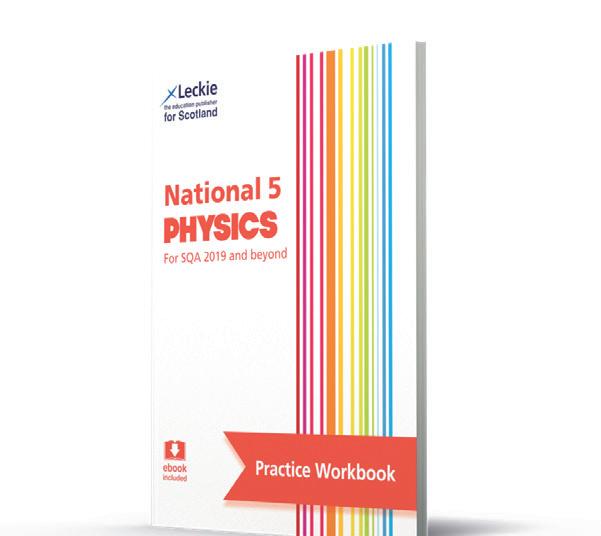












End of unit assessments and questions prepare students for their exams and assessments
We’ve created Your Exams to help you prepare. It tells you what you need to know and gives information and advice so that you can do your very best on the day of exams. Your Exams also contains rules you need to read and understand before exams start. Remember to prepare, stay calm and do your best. Ask your teacher or lecturer for a copy or scan the QR code to download today. www.sqa.org.uk/yourexams
